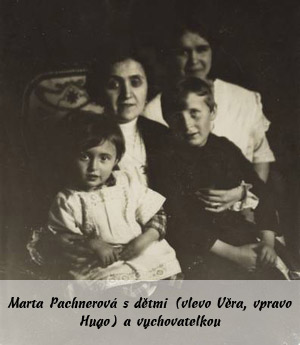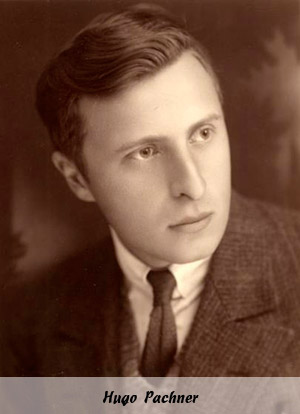OUR FINDINGS
OSKAR PACHNER
Born on January 29, 1880, in Německý Brod, he attended the local highschool between 1890 and 1896. He took over his fathers liquor store and became the owner of no. 104 in 1922. He died on March 13, 1937 in Německý Brod and is buried at the New Cemetery beside the husband of his daughter, Věra.

Oskar's wife Marta was born on August 3, 1886, in Vienna. She was a relative of composer Gustav Mahler, probably his uncle's granddaughter. After her husband's death, she lived in Prague (at least till 1938), and then probably at no. 477 Letná Street in Německý Brod. We don't know about her from then on, although she was likely forced to move to Prague in 1939. On July 6, 1942, she was deported with the AAq transport from Prague to Terezín, and from here, on July 14, with the AAx transport to Maly Trascianiets, where she apparently died immediately upon arrival.
Oskar and Marta Pachner had a son, Hugo, and a daughter, Věra.
Hugo was born on March 3, 1908, in Německý Brod. He attended the Německý Brod highschool between 1918 and 1928. He studied medicine at the Charles University in Prague. The letters that his father left behind reveal that he was an attentive student, but was very shy. He never married. He apparently performed his medical work in his hometown, till he was forced to move to Prague after March 1939, and was then deported on November 20, 1942, with the Cc transport from Prague to Terezín. He was then deported to Auschwitz on February 1, 1943, with the Cu transport. His later fate is unknown.

Věra was born on October 11, 1911 in Německý Brod. She attended the local highschool between 1922 and 1928 and later became a teacher. She married Alois Pokorný, also a teacher, born on February 11, 1908, in Chotěboř. Alois wasn't subject to the Nuremberg Laws and Věra survived the war thanks to him. She lived at no. 284 Brod, Žižkova Street, later no. 1431. They had no children. Alois was imprisoned from autumn 1944 in labor camps in Postoloprty u Loun and in Čakovice u Prahy. These camps were intended for half-Jews and the spouses of Jews. According to the list of Havlíčkův Brod holocaust victims in the "Havlíčkův Brod Area Resistance" almanach, Věra went through a similar camp in Hagibor, Prague. She was taken there on October 23, 1944 and continued to Terezín from there on February 4, 1945, where she lived to see the liberation.
After the war, Alois became a teacher at an eleven year middle and high school in Brod and died on January 18, 1961. Věra outlived him by 29 years; she died on October 6, 1990. She published her memories of the years of German occupation in the "Havlíčkův Brod Area Resistance" almanach.
These parts of her recollections were of greatest interest to us:
"As soon as it became clear who is and who isn't legally a Jew, the oppression graded rapidly. We weren't allowed to leave the city premises and we had an eight o'clock curfew. We were excluded from all public corporations, even the crematorium. We were banned from the cultural venues, public rooms, cinemas, theaters, study halls, libraries, sports facilities and public orchards. In Havlíčkův Brod, this ban was issued in 1941. The time of day we were allowed to shop was also set from 3 p.m. till 5 p.m. that year. Most of the supplies were already taken that late.
"We should have, and were sometimes forced to, hand in all our garments that weren't most basic necessities - most importantly, furs. We also had to hand in all our medical equipment, typewriters and sowing machines, cars, motorcycles, bicycles, recorders, musical instruments, jewellery, gold, silver and art, sports equipment and radio receivers. When Jews were then isolated from the public, we wouldn't even be allowed to go to a barber's. Students were first banned from universities, highschools and municipal schools, and eventually even from public schools.
"On August 10, 1939, they ordered all the Jews of Havlíčkův Brod to move to Prague. About ten families that have lived in town for generations were ousted. About 120 outcasts remained in Brod. We were constantly being harassed and threatened, we had to undergo several so-called registrations and medical examinations, the purpose of which we had no clue about. We were constantly being moved into smaller and less comfortable lodgings. The yellow Stars were ordered in 1941, this was meant to be an official defamation, but was more importantly a terror. We had no reason to be ashamed - we only had reason to fear. An unmarked Jew would blend in with a crowd and would never arouse any unwanted attention. Now he would be an outlaw for Germans and a menace to his Czech acquaintances, as greeting or talking to him would be a sort of demonstration, and would be punished in the Aryan fight, which fed off of similar incidents. Walking unmarked was mortally dangerous. This is how Mrs. Švestka of Chotěboř died - she went for water without her Star. She was revealed, deported to a concentration camp and within three weeks, both husband and son knew that mommy was dead. In Prague, suspicious individuals would be stopped and their papers checked. Marked non-Aryans would be searched thoroughly - their purses and suitcases included. Woe betide them if anything was out of order. Almost anything could be out of order. Newspapers that Jews weren't allowed to read, a core of an apple that they weren't allowed to have, a cigarette butt. Such an offence would bring on the concentration camp and a gruesome, inhuman death.
"In 1944, the government commissar Münzberger ordered that the Havlíčkův Brod Jewish Cemetery be closed and a playground for Hitler's Youth be set up in its place."